Best treatment for hypertension? | Last Rationale of the Week for 2020

This is our last post of 2020! We want to thank all of you for your support and participation in our Question and Rationale of the Week! We will see you in 2021 with more exciting questions and rationales. Can’t wait!
Our December 22nd Question asked how to best treat a blood pressure of 162/94 according to ADA Standards of Care. Less than half of respondents, chose the best answer.
Before we start though, if you don’t want any spoilers and haven’t tried the question yet, you can answer below: Answer Question
Question: JR is 63, has diabetes, and has a B/P of 162/94 which is repeated on a separate visit. JR also has albuminuria. What would be the recommended pharmacological approach based on the ADA Standards of Care?
Answer Choices:
- Start on DASH Diet plus one blood pressure medication.
- Start ACEi plus ARB.
- Start ACEi or ARB plus another blood pressure medication.
- Avoid diuretics if on an ACEi or ARB.
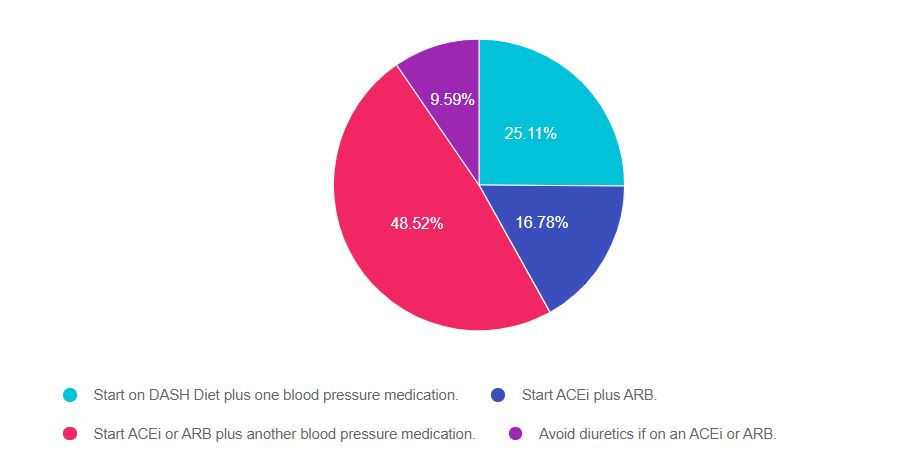
As shown above, the most common choice was option 3, the second most common answer was option 1, then option 2, and finally option 4.
Getting to the Best Answer
If you are thinking about taking the certification exam, the content of this practice test question will set you up for success. Being familiar with the ADA Standards of Care is critical to pass either the CDCES or BC-ADM exam. The section of CV risk management is especially important, since the leading cause of death in diabetes is heart disease.
Answer 1 is incorrect. 25.11% chose this answer. “Start on DASH Diet plus one blood pressure medication.” Starting this person on the DASH meal plan along with a BP medication are both correct, however, given the extreme hypertension, more action is required.
Answer 2 is incorrect. 16.78% of you chose this answer. “Start ACEi plus ARB.” According to the ADA Standards, it is not recommended to use both of these agents together. The standards recommend to use EITHER an ACEi or ARB plus another blood pressure agent (diuretic, Calcium Channel Blocker, etc) to treat hypertension (see image below).
Answer 3 is correct, 48.52% of you chose this answer “Start ACEi or ARB plus another blood pressure medication.” According to ADA Standards (see image below), a confirmed BP where either the systolic is 160 or greater and the diastolic is 100 or greater, requires the initiation of 2 anti-hypertensive medications. Of course, we would request home blood pressure monitoring, review symptoms of orthostatic hypotension, and encourage lifestyle interventions.
Diabetes specialists have a tremendous opportunity to reduce CV events by being familiar with the standards and advocating on behalf of our clients for needed interventions.
Answer 4 is incorrect, 9.59% of you chose this answer. “Avoid diuretics if on an ACEi or ARB.” ADA standards include adding a diuretic to an ACEi or ARB if blood pressure is not at target (see image below).
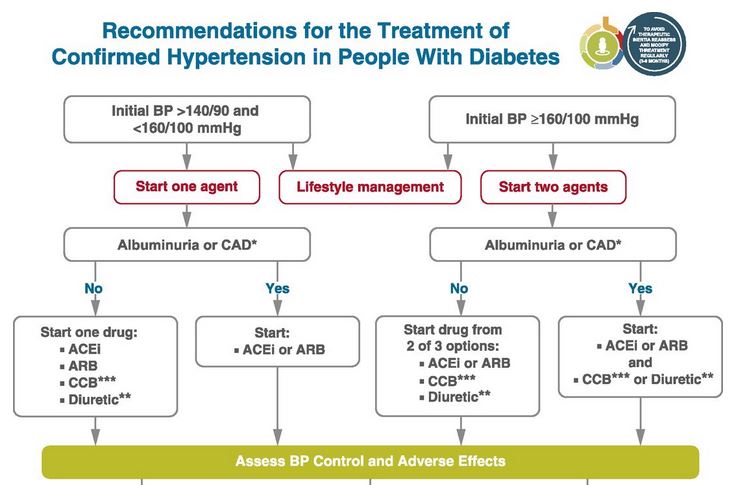
We hope you appreciate this week’s rationale! Thank you so much for taking the time to answer our Question of the Week and participate in this fun learning activity!
Level 1 – Diabetes Fundamentals 2021 Updates
This series is designed for health care professionals who are interested in getting started in diabetes education and for those actively working toward becoming a Certified Diabetes Care and Education Specialist. Each course in this series provides the critical building blocks and foundation for those entering the diabetes field. Plus, they prepare you to advance to our Level 2 Standards of Care Intensive Courses.
Join us for our 2021 Live Webinar Updates. All courses air at 11:30 a.m. (PST)
- January 12, 2021 – Class 1 – Getting to the Nitty Gritty 1.5 CEs
- January 14, 2021 – Class 2 -Nutrition and Exercise 1.5 CEs
- January 19, 2020 – Class 3 – Insulin Therapy & Pattern Management 1.5 CEs
- January 21, 2021 – Class 4 – Meds Overview for Type 2 – 1.5 CEs
- January 26, 2021 – Class 5 – Goals of Care 2020 – 1.5 CEs
- January 28, 2021 – Class 6 – Hypoglycemia, Sick Days, Monitoring, Foot Care 1.5 CEs

Instructor: Beverly Thomassian RN, MPH, CDCES, has been Board Certified in Advanced Diabetes Management for over 20 years. She is an Associate Clinical Professor at UCSF and Touro University and a nationally recognized diabetes expert.
Sign up for Diabetes Blog Bytes – we post one daily Blog Byte from Monday to Friday. And of course, Tuesday is our Question of the Week. It’s Informative and FREE! Sign up below!
[yikes-mailchimp form=”1″]
Accreditation: Diabetes Education Services is an approved provider by the California Board of Registered Nursing, Provider 12640, and Commission on Dietetic Registration (CDR), Provider DI002. Since these programs are approved by the CDR it satisfies the CE requirements for the CDCES regardless of your profession.*
The use of DES products does not guarantee the successful passage of the CDCES exam. CBDCE does not endorse any preparatory or review materials for the CDCES exam, except for those published by CBDCE.
Rationale of the Week | Why the Sugar Spike?

Our December 15th Question of the week was tricky and over 59% of respondents, chose the best answer.
Before we start though, if you don’t want any spoilers and haven’t tried the question yet, you can answer below: Answer Question
Question: JL is a 78-year-old with type 2 diabetes who has been taking metformin 1000mg BID for the past year. JL checks BG each morning and says it usually ranges from 100 – 138. Her most recent A1c came back at 9.6% and the provider started her on dapagliflozin (Farxiga) 5 mg daily two days ago. JL arrives at the clinic in a panic and says has been checking her blood glucose 3 times a day it has “jumped up to 236 and 242”. The diabetes specialist double-checked and verified random glucose of 249. What is the best explanation?
Answer Choices:
- Dapagliflozin is associated with transient hyperglycemia.
- Double-check kidney function to verify GFR is adequate.
- Discovery of hyperglycemia due to random BG checks.
- Hyperglycemia due to the initiation of steroid therapy.

As shown above, the most common choice was option 3, the second most common answer was option 2, then option 1, and finally option 4.
Getting to the Best Answer
If you are thinking about taking the certification exam, the content of this practice test question will set you up for success. This question lures test takers into trying to make an answer fit. Get rid of wrong answers first and choose the best answer.
Answer 1 is incorrect. 15.53% chose this answer. “Dapagliflozin is associated with transient hyperglycemia.” Dapagliflozin (Farxiga) is a SGLT-2 Inhibitor, also known as a “glucoretic”. It causes excretion of glucose from the renal tubules and is not associated with transient hyperglycemia. As a matter of fact, no diabetes medications cause hyperglycemia.
Answer 2 is incorrect. 17.54% of you chose this answer. “Double-check kidney function to verify GFR is adequate.” It is true that people need to have a GFR of 45 or greater to take Dapagliflozin (Farxiga). However, an inadequate GFR is not associated with glucose spikes. Also, the test question gives no data on GFR, so this makes this a very unlikely best answer.
Answer 3 is correct, 59.44% of you chose this answer “Discovery of hyperglycemia due to random BG checks.” Here are the Diabetes Specialist’s notes regarding JL.
JL stopped by the office today worried about sudden blood sugar elevations of 273 in 284 after starting a new medication on Friday for diabetes.
Dr. started JL on Dapagliflozin (Farxiga) half pill once a day and the patient has been taking it for two days now. JL is nervous about continuing to take it because JL thinks that is causing her blood sugars to elevate. The patient also takes metformin daily.
Before, the patient was only checking her blood sugar once a day and it was always in the morning. Her morning blood sugars were in the 120- 140 range. However, now JL is checking her blood sugars throughout the day and discovered that blood sugars are actually much higher than JL thought because was only checking in the morning. In the office I checked blood sugar it was 251. JL denied fever or cough.
Reassured JL that it was not the Dapagliflozin (Farxiga) causing high blood sugar. Focused on the benefits of Dapagliflozin (Farxiga) including lower blood sugar, lower blood pressure and protection against heart and kidney disease. Reviewed briefly the importance of limiting carbohydrates and juices or sodas until we can get her blood sugars closer to target.
Answer 4 is incorrect, 7.50% of you chose this answer. “Hyperglycemia due to the initiation of steroid therapy.” This is another juicy answer, but since the question doesn’t mention JL is on steroids, this is not the best answer.
We hope you appreciate this week’s rationale! Thank you so much for taking the time to answer our Question of the Week and participate in this fun learning activity!
Level 1 – Diabetes Fundamentals 2021 Updates
This series is designed for health care professionals who are interested in getting started in diabetes education and for those actively working toward becoming a Certified Diabetes Care and Education Specialist. Each course in this series provides the critical building blocks and foundation for those entering the diabetes field. Plus, they prepare you to advance to our Level 2 Standards of Care Intensive Courses.
Join us for our 2021 Live Webinar Updates. All courses air at 11:30 a.m. (PST)
- January 12, 2021 – Class 1 – Getting to the Nitty Gritty 1.5 CEs
- January 14, 2021 – Class 2 -Nutrition and Exercise 1.5 CEs
- January 19, 2020 – Class 3 – Insulin Therapy & Pattern Management 1.5 CEs
- January 21, 2021 – Class 4 – Meds Overview for Type 2 – 1.5 CEs
- January 26, 2021 – Class 5 – Goals of Care 2020 – 1.5 CEs
- January 28, 2021 – Class 6 – Hypoglycemia, Sick Days, Monitoring, Foot Care 1.5 CEs

Instructor: Beverly Thomassian RN, MPH, CDCES, has been Board Certified in Advanced Diabetes Management for over 20 years. She is an Associate Clinical Professor at UCSF and Touro University and a nationally recognized diabetes expert.
Sign up for Diabetes Blog Bytes – we post one daily Blog Byte from Monday to Friday. And of course, Tuesday is our Question of the Week. It’s Informative and FREE! Sign up below!
[yikes-mailchimp form=”1″]
Accreditation: Diabetes Education Services is an approved provider by the California Board of Registered Nursing, Provider 12640, and Commission on Dietetic Registration (CDR), Provider DI002. Since these programs are approved by the CDR it satisfies the CE requirements for the CDCES regardless of your profession.*
The use of DES products does not guarantee the successful passage of the CDCES exam. CBDCE does not endorse any preparatory or review materials for the CDCES exam, except for those published by CBDCE.
Question of the Week | Which New Year’s Resolution is SMART?

JZ is excited for 2021 and wants to work on some New Years resolutions. Which of the following would be considered a SMART behavioral goal for the New Year?
What is the best answer?
- I will check my sugars every other day before breakfast for one month.
- I will exercise or lift weights even if I don’t feel motivated, for the next year.
- I plan to avoid sugary drinks, chips and candy and junk foods.
- I commit to taking all of my medications daily and losing 3 pounds.
Click here to test your knowledge!
Level 1 – Diabetes Fundamentals 2021 Updates
This series is designed for health care professionals who are interested in getting started in diabetes education and for those actively working toward becoming a Certified Diabetes Care and Education Specialist. Each course in this series provides the critical building blocks and foundation for those entering the diabetes field. Plus, they prepare you to advance to our Level 2 Standards of Care Intensive Courses.
Join us for our 2021 Live Webinar Updates. All courses air at 11:30 a.m. (PST)
- January 12, 2021 – Class 1 – Getting to the Nitty Gritty 1.5 CEs
- January 14, 2021 – Class 2 -Nutrition and Exercise 1.5 CEs
- January 19, 2020 – Class 3 – Insulin Therapy & Pattern Management 1.5 CEs
- January 21, 2021 – Class 4 – Meds Overview for Type 2 – 1.5 CEs
- January 26, 2021 – Class 5 – Goals of Care 2020 – 1.5 CEs
- January 28, 2021 – Class 6 – Hypoglycemia, Sick Days, Monitoring, Foot Care 1.5 CEs

Instructor: Beverly Thomassian RN, MPH, CDCES, has been Board Certified in Advanced Diabetes Management for over 20 years. She is an Associate Clinical Professor at UCSF and Touro University and a nationally recognized diabetes expert.
Sign up for Diabetes Blog Bytes – we post one daily Blog Byte from Monday to Friday. And of course, Tuesday is our Question of the Week. It’s Informative and FREE! Sign up below!
[yikes-mailchimp form=”1″]
Accreditation: Diabetes Education Services is an approved provider by the California Board of Registered Nursing, Provider 12640, and Commission on Dietetic Registration (CDR), Provider DI002. Since these programs are approved by the CDR it satisfies the CE requirements for the CDCES regardless of your profession.*
The use of DES products does not guarantee the successful passage of the CDCES exam. CBDCE does not endorse any preparatory or review materials for the CDCES exam, except for those published by CBDCE.
Depression & Diabetes | Golden Milk Recipie
The Winter Solstice, on December 21, marked the shortest day in the Northern Hemisphere. People in New York got just over 9 hours 15 minutes of sun, while those in Anchorage Alaska got fewer than 5.5 hours.

Personally, I am already yearning for more light.
Lack of light can contribute to depression. The idea that people are more susceptible to depression in the winter months wasn’t picked up until the 1980’s when South African psychiatrist Norman Rosenthal moved to the US and noticed a change in his mood during the New York winters. Dr. Rosenthal, Dr. Al Lewy, and Dr. Thomas Wehr investigated and identified Seasonal Affective Disorder (SAD). In 1987 it was included in DSM.(1)
Depression rates higher during pandemic
This winter 2020 is an extra dark one. A recent study showed that depression symptom prevalence was more than 3-fold higher during the COVID-19 pandemic than before. During the pandemic, many people are making a lower-income or have no income, have depleted their savings, and have more exposure to stressors, which were all associated with a greater risk of depression. (2)
Studies show that people with diabetes are more susceptible to depression. Depression is three times as prevalent in people with diabetes when assessed by self-report. The combination of diabetes and depression present a major clinical challenge as the outcomes of both conditions are worsened in the presence of the other. Quality of life is worse, diabetes self-management is impaired, the incidence of complications is increased, and life expectancy is reduced. (3)
Symptoms commonly associated with SAD and clinical depression include:
- Feelings of sadness, tearfulness, emptiness, or hopelessness
- Frequent or recurrent thoughts of death, suicidal thoughts, suicide attempts, or suicide
- A tendency to oversleep, early-morning wakefulness or insomnia
- Reduced appetite and weight loss or increased cravings for food and weight gain
- Slowed thinking, speaking, or body movements
- Unexplained physical problems, such as back pain or headaches
- Loss of interest in things once pleasurable
- Fatigue
- Difficulty concentrating, remembering details, and making decisions
- Angry outbursts, irritability or frustration, even over small matters
It is an important time to check in with our clients, colleagues, friends, and family regarding symptoms of depression.
Refer to mental health providers as needed. As I am writing this blog my sister texted me that she is feeling very sad, unmotivated, and just wants to sleep. Diabetes Education Services has resources to help us screen our clients for depression in the Psychological Care Assessment Resource Page.
Tumeric – Golden Spice for Healing
Can food, in particular a golden spice, help those of us without the more serious clinical depression cope this winter with milder winter blues?
Turmeric is a plant with a very long history of medicinal use, dating back 4000 years. In parts of Southeast Asia, turmeric is used not only as a principal spice but also as a component in religious ceremonies.
Turmeric, derived from the root of Curcuma longa, a flowering plant of the ginger family, is a gold-colored spice commonly used in the Indian subcontinent, not only for health care but also for the preservation of food and as a yellow dye for textiles. Curcumin, which gives the yellow color to turmeric, was first isolated almost two centuries ago, and its structure as diferuloylmethane was determined in 1910.
Since the time of Ayurveda (1900 BCE) numerous therapeutic activities have been assigned to turmeric for a wide variety of diseases and conditions. Extensive research within the last half-century has proven that most of these activities, once associated with turmeric, are due to curcumin. Curcumin has been shown to exhibit antioxidant, anti-inflammatory, antiviral, antibacterial, antifungal, and anticancer activities. (4)
“Curcumin can influence several mechanisms in the body; in particular, it is a powerful natural anti-inflammatory and antioxidant. This has relevance to depression because people with depression have greater inflammation and oxidative stress, which can affect all major organs of the body, including the brain”, reports Adrian Lopresti, PhD., a clinical psychologist and researcher at the School of Psychology and Exercise Science at Murdoch University. (5)
Due to curcumin’s anti-inflammatory effect, a 2013 review of studies suggests that curcumin can decrease the level of glucose in the blood, as well as other diabetes-related complications. (6) 500-1000 mg of curcumin per day has been found to promote the anti-inflammatory effect. (7) 1 teaspoon of fresh turmeric has about 200 mg of curcuminoids. Curcumin’s bioavailability can be enhanced by 2000% by combining it with black pepper (piperine is the major active component). (8)
Try turmeric tea or add turmeric to scrambled eggs, to rice as it is cooking, to stews. You can also try my favorite before bed treat, Golden Milk.

Golden Milk Recipe – Yield 2 servings
- 2 cups milk (coconut, almond, soy milk can be substituted)
- 1 Tb honey or stevia syrup to taste
- 1 Tb coconut oil
- 1 tsp ground turmeric
- 1 tsp ground cinnamon
- Pinch of ground black pepper
- Pinch of grated fresh ginger or ¼ tsp ground ginger
Directions
Simply pour all ingredients into a small saucepan, whisk to combine ingredients. Heat until hot to the touch but not boiling – about 4 minutes. Enjoy warm.
Written by Dawn DeSoto RD, CDCES, our resident Nutrition Content Writer
References
- Melrose, S. (2015) Seasonal affective disorder: an overview of assessment and treatment approaches. Depression research and treatment. 2015
- Ettman, CK, Abdalla, SM, Cohen, GH. Prevalence of Depression Symptoms in US Adults Before and During the COVID-19 Pandemic. JAMA NETW Open. 2020;3(9)
- Holt RI, de Groot M, Golden SH. Diabetes and depression. Curr Diab Rep. 2014;14(6):491
- Hewlings, S, Kalman DS. Curcumin: A Review of Its’ Effects on Human Health. Foods. 2017 Oct; 6(10): 92
- Lopresti AL, Maes M, Maker GL, et al. Curcumin for the treatment of major depression: A randomized, double blind, placebo-controlled study. J Affect Dis. 2014;167:368-375
- Zhang DW, Fu M, Gao SH, Liu JL. Curcumin and Diabetes: A Systemic Review Evid Based Complement Alternat Med. 2013,2013:636053
- Gupta SV, Patchva S, Aggarwal BB. Therapeutic Roles of Curcumin: Lessons Learned from Clinical Trials: AAPS J. 2013 15(1):195-218
- Prasad S, Tyagi AK, Bharat B. Recent Developments in Delivery, Bioavailability, Absorption and Metabolism of Curcumin: the Golden Pigment from Golden Spice. Cancer Res Treat. 2014 Jan:46(1)2-18
Level 2 | Assessing Coping Skills Standards | 1.5 CEs
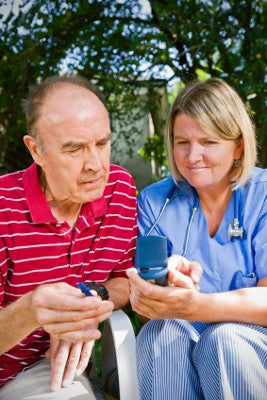
We are updating this course to reflect the 2021 ADA Standards of Care. This presentation will include the latest information on Social Determinants of health, assessment strategies and approaches. We will explore the psychosocial issues that can discourage individuals from adopting healthier behaviors and provides strategies to identify and overcome these barriers.
Life studies are used to apply theory to real life situations. A great course for anyone in the field of diabetes education or for those looking for a new perspective on assessment and coping strategies.
Topics include:
- Name assessment areas of healthy coping
- List psycho-social and emotional barriers
- Provide strategies for healthcare professionals to identify and overcome barriers
- Discuss strategies to develop an individualized diabetes education plan
This course is included in: Level 2 – Standards of Care Intensive. Purchase this course individually for $29 or the entire bundle and save 70%.
Enroll in our entire Level 2 – Standards of Care Intensive to join us for the below for Live Webinar Updates. All courses air at 11:30 a.m. (PST)
- December 23, 2020 – Older Adults & Diabetes – 1.5 CEs
- December 29, 2020 – Assessing Coping Skills Standards – 1.5 CEs
- December 30, 2020 – Hyperglycemic Crisis Standards – 1.0 CEs
- February 2, 2021 – 2021 Standards of Care Update – 2.0 CEs
Sign up for Diabetes Blog Bytes – we post one daily Blog Byte from Monday to Friday. And of course, Tuesday is our Question of the Week. It’s Informative and FREE! Sign up below!
[yikes-mailchimp form=”1″]Accreditation: Diabetes Education Services is an approved provider by the California Board of Registered Nursing, Provider 12640, and Commission on Dietetic Registration (CDR), Provider DI002. Since these programs are approved by the CDR it satisfies the CE requirements for the CDCES regardless of your profession.*
The use of DES products does not guarantee the successful passage of the CDCES exam. CBDCE does not endorse any preparatory or review materials for the CDCES exam, except for those published by CBDCE.
Question of the Week | Best treatment for hypertension?

JR is 63, has diabetes and has a B/P of 162/94 which is repeated on a separate visit. JR also has albuminuria. What would be the recommended pharmacological approach based on the ADA Standards of Care?
What is the best answer?
- Start on DASH Diet plus one blood pressure medication.
- Start ACEi plus ARB.
- Start ACEi or ARB plus another blood pressure medication.
- Avoid diuretics if on an ACEi or ARB.
Click here to test your knowledge!
Level 1 – Diabetes Fundamentals 2021 Updates
This series is designed for health care professionals who are interested in getting started in diabetes education and for those actively working toward becoming a Certified Diabetes Care and Education Specialist. Each course in this series provides the critical building blocks and foundation for those entering the diabetes field. Plus, they prepare you to advance to our Level 2 Standards of Care Intensive Courses.
Join us for our 2021 Live Webinar Updates. All courses air at 11:30 a.m. (PST)
- January 12, 2021 – Class 1 – Getting to the Nitty Gritty 1.5 CEs
- January 14, 2021 – Class 2 -Nutrition and Exercise 1.5 CEs
- January 19, 2020 – Class 3 – Insulin Therapy & Pattern Management 1.5 CEs
- January 21, 2021 – Class 4 – Meds Overview for Type 2 – 1.5 CEs
- January 26, 2021 – Class 5 – Goals of Care 2020 – 1.5 CEs
- January 28, 2021 – Class 6 – Hypoglycemia, Sick Days, Monitoring, Foot Care 1.5 CEs

Instructor: Beverly Thomassian RN, MPH, CDCES, has been Board Certified in Advanced Diabetes Management for over 20 years. She is an Associate Clinical Professor at UCSF and Touro University and a nationally recognized diabetes expert.
Sign up for Diabetes Blog Bytes – we post one daily Blog Byte from Monday to Friday. And of course, Tuesday is our Question of the Week. It’s Informative and FREE! Sign up below!
[yikes-mailchimp form=”1″]
Accreditation: Diabetes Education Services is an approved provider by the California Board of Registered Nursing, Provider 12640, and Commission on Dietetic Registration (CDR), Provider DI002. Since these programs are approved by the CDR it satisfies the CE requirements for the CDCES regardless of your profession.*
The use of DES products does not guarantee the successful passage of the CDCES exam. CBDCE does not endorse any preparatory or review materials for the CDCES exam, except for those published by CBDCE.
Winter Solstice – The Great Conjunction

Today, is Winter Solstice, when we experience the shortest day and longest night of the year. From here we will slowly gain more light each day, marking this as an astronomical shift from darkness to light.
For many cultures, winter solstice marks a day of rebirth, saying goodbye to the past year and a universal deep breath for the future.
Susan Cooper penned a beautiful poem about winter solstice that we are thrilled to share with you below. Given this incredibly difficult year, it seems especially poignant and I hope you enjoy the read.
Great conjunction this close last happened 400 years ago.
As a special bonus this year, Jupiter and Saturn will align in the night sky today, December 21st, in an event astronomers call the “great conjunction.”
The last time Jupiter and Saturn came this close was 1623, but that conjunction was too near the sun to be seen by Earthlings. 1226 is actually the most recent time such close conjunction of Jupiter and Saturn was visible to humans.
You can watch it online with webcasts from The Virtual Telescope Project, Slooh at NASA Telescope here.
The Shortest Day by Susan Cooper
And so the Shortest Day came and the year died
And everywhere down the centuries of the snow-white world
Came people singing, dancing
To drive the dark away
They lighted candles in the winter trees
They hung their homes with evergreen
They burned beseeching fires all night long
To keep the year alive
And when the new year’s sunshine blazed awake
They shouted, reveling
Through all the frosty ages you can hear them
Echoing behind us—listen!
All the long echoes, sing the same delight
This Shortest Day
As promise wakens in the sleeping land:
They carol, feast, give thanks
And dearly love their friends
And hope for peace.
And now so do we, here, now,
This year and every year.
Welcome, Yule!
This poem is available as a children’s hardcover with beautiful watercolor illustrations by Carson Ellis.
COVID-19 & Diabetes Resource Page | Free Resource Friday

As health care professionals and Diabetes Specialists, how do we keep up to date with all the latest information on diabetes and COVID-19?
How do we prepare people with diabetes for the possibility of a COVID-19 infection and hospitalization?
As Diabetes Care Specialists, it is important to have easy access to the latest information on COVID-19 and diabetes.
To help, we have put together a list of free resources by category so you can easily access important and relevant information about COVID-19.
Plus, we have updated our Sick Days / COVID-19 and Diabetes Handout that we invite you to share with colleagues and people living with diabetes.
COVID-19, Sick days & Diabetes: Handout
Updated to reflect the latest CDC guidelines. Reviews sick day instruction for people with diabetes, plus COVID-19 specific information.
Included in COVID-19 Resource page:
- FREE Webinar on COVID & Diabetes
- Past Blog Bytes on COVID-19
- Article Library
- Handouts
Article Library Sections
- Overview
- Social Determinants of Health and Racial Disparities
- COVID Pathophysiology
- Diabetes and COVID Research and Treatments
- Long Haulers Syndrome and Vaccine Information
Upcoming Webinar
Level 2 | Older Adults and Diabetes Standards | 1.5 CEs
Join us live on December 23rd at 11:30 am (PST)

We have updated this content based on the ADA 2021 Standards of Care.
We are living longer and more people are getting diabetes. The American Diabetes Association has updated the Older Adults Standards, with special attention to considering a reduction of medication and insulin therapy intensity. The older population has unique issues and special needs that require consideration as we provide diabetes self-management education. This online course highlights key areas of assessment, intervention, and advocacy for older clients living with diabetes.
Topics include:
- Self-management considerations for older individuals
- Strategies to prevent complications and maintain optimal quality of life
- The role of the Diabetes Educator as an advocate
Join us live on December 23rd at 11:30 am (PST)
Can’t join us live?
Don’t worry, we will send you a link to the recorded version.
This course is included in: Level 2 – Standards of Care Intensive. Purchase this course individually for $29 or the entire bundle and save 70%.
Enroll in our entire Level 2 – Standards of Care Intensive to join us for the below for Live Webinar Updates. All courses air at 11:30 a.m. (PST)
- December 23, 2020 – Older Adults & Diabetes – 1.5 CEs
- December 29, 2020 – Assessing Coping Skills Standards – 1.5 CEs
- December 30, 2020 – Hyperglycemic Crisis Standards – 1.0 CEs
- February 2, 2021 – 2021 Standards of Care Update – 2.0 CEs
All hours earned count toward your CDCES Accreditation Information
Sign up for Diabetes Blog Bytes – we post one daily Blog Byte from Monday to Friday. And of course, Tuesday is our Question of the Week. It’s Informative and FREE! Sign up below!
[yikes-mailchimp form=”1″]Accreditation: Diabetes Education Services is an approved provider by the California Board of Registered Nursing, Provider 12640, and Commission on Dietetic Registration (CDR), Provider DI002. Since these programs are approved by the CDR it satisfies the CE requirements for the CDCES regardless of your profession.*
The use of DES products does not guarantee the successful passage of the CDCES exam. CBDCE does not endorse any preparatory or review materials for the CDCES exam, except for those published by CBDCE.
Admission Glucose Level Predicts COVID Related Deaths
Blood glucose levels provide an immediate snapshot of a person’s state of inflammation, with or without diabetes.
According to recent research findings, admission glucose is also an excellent predictor of COVID-19 related deaths and severity of illness.
Researchers in Spain retrospectively evaluated over 11,000 patients positive with COVID on admission in 109 hospitals throughout Spain. They also evaluated admission blood glucose levels and their findings were startling.
People with COVID and glucose levels of 140 mg/dL or greater were twice as likely to die than those with normal glucose levels (41.4% vs. 15.7%).
The researchers were also able to stratify the risk of death based on admissions glucose levels.
For all 11, 000 patients admitted with COVID in this study, the mortality rate was 20%.
Mortality Risk Stratified by BG
For patients with admission glucose of 140 – 180, the mortality rate increased to 33%.
The mortality rate skyrocketed to 41% if admission glucose was 180 mg/dL or greater.
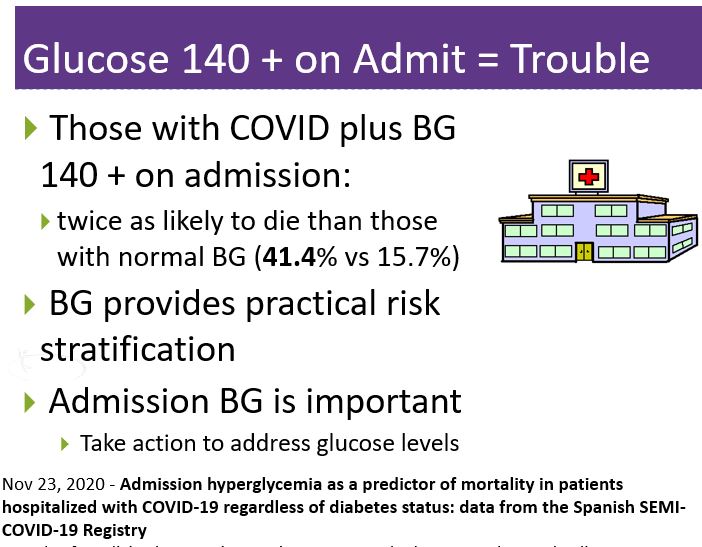
Key messages
- Screen for hyperglycemia in all admissions.
- Maintain optimal blood glucose levels in an outpatient setting.
- Early treatment of hyperglycemia should be mandatory for patients hospitalized with COVID-19.
- Admission hyperglycemia should be addressed in all patients regardless of prior history of diabetes.
- Based on recent research, hospitalized patients with diabetes also have improved outcomes when immediately started on the DPP-IV Inhibitor, Sitagliptin (Januvia).
Read More Here Admission hyperglycemia as a predictor of mortality in patients hospitalized with COVID-19 regardless of diabetes status: data from the Spanish SEMI-COVID-19 Registry. November 2020
Annals of Medicine by Francisco Javier Carrasco-Sánchez, MD, PhD, and colleagues. Nov 23, 2020
COVID & Diabetes Update – FREE Webinar | Ready for Viewing!
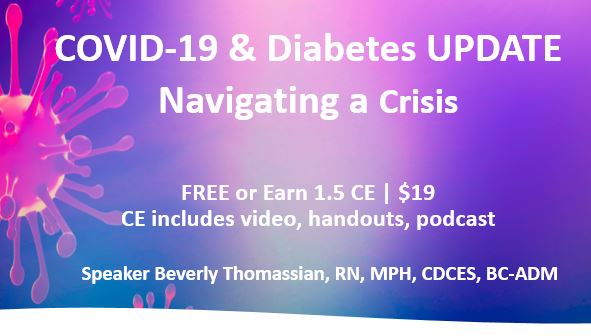
COVID & Diabetes Update
Navigating a Crisis
Recorded & Ready for Viewing
Coach Beverly Thomassian, RN, MPH, CDCES, BC-ADM, has completely updated this critical presentation, to bring health care professionals up-to-date on the current state of COVID and its impact on diabetes care. She summarizes key information including critical teaching points and management strategies for people with diabetes who develop a COVID-19 infection.
Topics Include:
- Discuss the current state of diabetes in the United States.
- Describe the relationship between COVID and health care disparities
- Explore the impact of COVID infection on those with pre-existing diabetes.
- Discuss treatment strategies for COVID and diabetes, including new vaccines.
- List critical teaching points for people with diabetes and COVID.
Join us to learn critical information about Diabetes and COVID Management

Instructor: Beverly Thomassian RN, MPH, CDCES, has been Board Certified in Advanced Diabetes Management for over 20 years. She is an Associate Clinical Professor at UCSF and Touro University and a nationally recognized diabetes expert.
Sign up for Diabetes Blog Bytes – we post one daily Blog Byte from Monday to Friday. And of course, Tuesday is our Question of the Week. It’s Informative and FREE! Sign up below!
[yikes-mailchimp form=”1″]
Accreditation: Diabetes Education Services is an approved provider by the California Board of Registered Nursing, Provider 12640, and Commission on Dietetic Registration (CDR), Provider DI002. Since these programs are approved by the CDR it satisfies the CE requirements for the CDCES regardless of your profession.*
The use of DES products does not guarantee the successful passage of the CDCES exam. CBDCE does not endorse any preparatory or review materials for the CDCES exam, except for those published by CBDCE.








